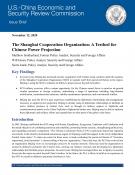Will Green, Sierra Janik

Summary:
This issue brief examines China’s efforts to use the Shanghai Cooperation Organization (SCO), an organization originally founded by China, Russia, and Central Asian countries, as a platform to project power and influence beyond China’s borders. The paper analyzes the power projection capabilities and diplomatic agreements China is developing through the SCO and assesses the implications of China’s efforts for the United States.
Introduction
In 2001, Beijing established the SCO along with Russia, Kazakhstan, Kyrgyzstan, Tajikistan, and Uzbekistan with the stated objectives of combatting terrorism and instability, promoting border security, strengthening political ties, and expanding economic cooperation.1 The Chinese Communist Party (CCP) in particular feared that separatist movements in the minority-dominated autonomous region of Xinjiang could find support in the newly independent Central Asian states. 2 To shore up control in those areas, it made combating the perceived threats of “terrorism, separatism[,] and extremism” a central calling of the new organization. 3 Since that time, the SCO has evolved into an organization Beijing views as increasingly critical to its security interests. China has used the organization to extend its defensive perimeter into Central Asia, carrying out military exercises and developing key diplomatic relationships that facilitate power projection. In recent years, Beijing has leveraged these ties to deploy its security forces into the region to patrol beyond China’s borders. In the future, the PLA is likely to build on its experience in the SCO to extend its defensive perimeter elsewhere in Asia.
No comments:
Post a Comment